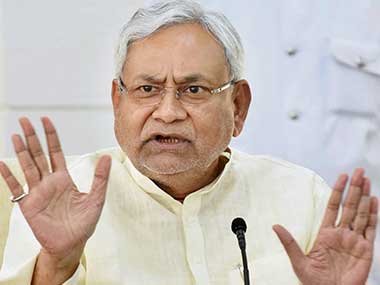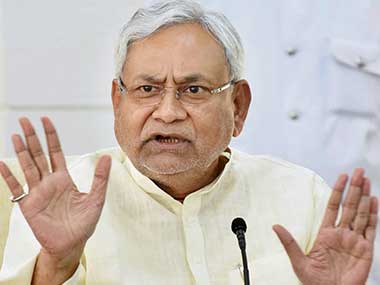Speaking at a rally in November 2016, Bihar chief minister Nitish Kumar, recounting the virtues of the state’s prohibition policy, claimed that it was linked to lower crime rates and—wait for it— rising _rasgulla_ sales. While Firstpost does not have statistics on rasgulla sales, the data on crime rate does not bear out Kumar’s assertion. [caption id=“attachment_4419859” align=“alignleft” width=“380”]  File image of Bihar chief minister Nitish Kumar. PTI[/caption] An _Indiaspend_ article in January 2017 reported that cognisable crimes increased by 13 percent from April to October 2016, or from 14,279 in April to 16,153 in October. Two years later, the picture is even starker. The number of cognisable crimes reported in Bihar saw a steep rise of 24.4 percent from 2016 to 2017, increasing from 1,89,681 to 2,36,037, the state police’s website revealed. One could argue this rise in cognisable crimes can be partly explained by the rise in overall population in the same period. However, statistics do not appear to support this. The rise in number of crimes between 2014 and 2015 was a mere 0.19 percent, while the corresponding figure between 2015 and 2016 was actually in the negative, at -2.93 percent. It was little surprise, then, that BJP leader Sushil Kumar Modi, defending the liquor ban in a post on Twitter, highlighted the reduction in crime numbers but did not mention that they were between 2015 and 2016. He left out the statistics from 2017 in his post.
भाजपा ने विपक्ष में रहने के बावजूद पूर्ण शऱाबबंदी का समर्थन किया था और इस मुद्दे पर 21 जनवरी 2017 में बनी मानव श्रृंखला में पार्टी शामिल हुई थी। दो साल बाद इसके ये सुखद परिणाम सबके सामने हैं कि राज्य में हत्या की घटनाएं 3,178 से 2,803 और डकैती की घटनाएं 426 से घटकर 325 हो गई... pic.twitter.com/iWaYsttJTr
— Sushil Kumar Modi (मोदी का परिवार ) (@SushilModi) April 5, 2018
To be sure, as the liquor ban was one of Nitish Kumar’s key poll promises, the state government appears to have put in significant efforts to implement the policy. According to a report in Hindustan Times, the police and excise department have registered over 96,000 cases and placed more than 4,000 people in jail under the prohibition law. In fact, Nitish Kumar has even constituted a separate wing, headed by an Inspector-General-rank officer in an attempt to enforce the law. People in Bihar have come up with innovative code words to dodge the ban, according to another report in Hindustan Times. For example, “pure milk” is said to be code for Indian-made foreign liquor (IMFL), while “bechara” is the code word for country liquor. The prohibition law in Bihar may also have been particularly harsh on marginalised communities. A report in The Telegraph quoted a Dalit MLA from the JD(U) as saying that the community feels that the situation is worse than even Lalu Prasad Yadav’s tenure. According to the report, of 7,735 people arrested in Gaya district alone, 3,957 are Dalits. The prohibition policy has also had to deal with the question of what to do with the liquor seized. In an infamous incident last year, officials who were questioned about seized liquor that went missing claimed rodents drank some of it. Two years after Bihar’s prohibition policy took effect, it remains a contentious issue. Going by recent history, it appears that it will make waves in the state’s political scene.


)

)
)
)
)
)
)
)
)



